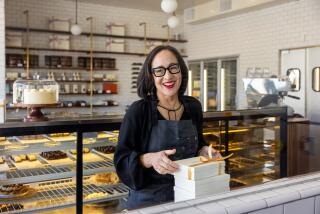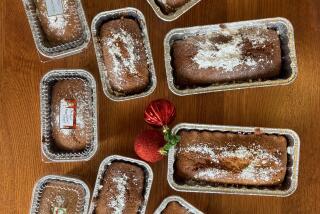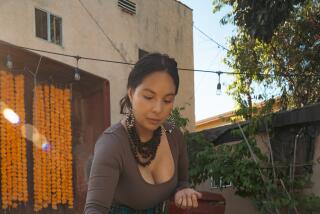Sweet Memories of Mother
Chocolate filled my childhood home on Valentine’s Day, pounds and pounds of it, in red heart-shaped boxes with satin bows. My mother would read the cards to my father and then stack the bounty high out of my reach. The bows were mine, to put in my dolls’ hair.
The chocolates belonged to my mother, who was born on Valentine’s Day.
I longed for the moment when she would open a box, so that I could inhale the rich, sweet scent. The chocolates, decorated with swirls and nuts, to me had the allure of the finest jewelry.
All day long, the boxes came from friends and family in New York City, my faraway fantasy land. New York was the setting of my favorite childhood stories, the ones my mother told me about her life before me.
You see, I was fed on tales of chocolate because I am the daughter of a chocolate taster. My mother tasted chocolate for more than a dozen years at a New York chocolate factory. And it was through chocolate that my parents met.
“Tell me about the chocolate factory,” I would beg my mother, who through her stories would lead me back to a long-ago world.
Chocolate, she taught me, was central to my family’s history, both as its savior and as a catalyst for love.
But chocolate left my life when my mother died. I stopped celebrating Valentine’s Day altogether.
*
Then last week, I found myself hunting in the garage for a long-unopened maroon-bound volume. It is called “The Chemistry, Flavouring and Manufacture of Chocolate Confectionery and Cocoa,” and my father gave it to my mother in 1932 on their first wedding anniversary.
I have been reading the book in the last few days, learning about milk chocolate conching, hand-covering and sugar bloom.
“Tell me about my mother and the chocolate factory,” I urge in e-mails, and from rural Vermont my 88-year-old Aunt Lillian e-mails back, caught up in her own memories and my chocolate revival.
The other day, in honor of my mother, I visited the See’s Candies manufacturing plant on La Cienega Boulevard, and spent a morning with the chief chocolate taster.
Under Jesus Soria’s wing, I sampled sumptuous milk chocolate straight out of the vat, unabashedly licking it from my fingers. I felt like a participant in my mother’s magical world, albeit in a different century, on a different coast.
*
In the bland Chicago suburb of my childhood, my mother wasn’t like other mothers.
Because she’d had me late in life, she was the age of my friends’ grandmothers. She looked different too, with her long, red hair braided around her head.
My friends ate Wonder bread. She made her own thick-crusted rough loaves.
Sometimes I just wanted to fit in. But I didn’t mind that she didn’t chauffeur me around town like the other mothers. My mother never learned to drive, so we walked together. And when we walked, she told stories about her childhood in lower Manhattan.
“Tell me about the horse and your foot,” I would plead, and she would relate how the heavy wheel of a horse-drawn wagon ran over the toe of her high-buttoned shoe.
*
I liked to hear about my mother’s birth, in 1906, in a tenement near what is now Battery Park. How excited everyone had been about the first child of my grandparents -- a Scotch-Irish bookkeeper and a Scottish nurse. How so many relatives insisted on naming the baby girl that they finally christened her Lydia Matilda Margaret Valentina Graf Wark.
Money was scarce in my mother’s childhood home, she said, until my grandfather was hired at a munitions plant in Morgan, N.J., during World War I. Then my family moved into a spacious government home and bought brand-new Mission oak furniture to decorate it.
“We were so happy,” my mother would say as she launched into the tale of how that good luck changed in 1918 when the munitions plant exploded, killing 64 people. No relatives died, but all that was left of their home was a bathtub melted into a twisted metal mass and a lump of glass that had been a crystal bowl.
Chocolate came to the rescue, my mother told me.
*
It was at Runkel Bros., the chocolate factory, that my grandfather finally found another job, in 1919 as a bookkeeper.
The family settled in Baldwin on Long Island, where my mother graduated from high school in 1923.
She was bright and excelled in the sciences, but college was out of the question, she told me. So she interviewed at Runkel Bros. and was hired as the assistant to the laboratory manager to taste and test the chocolate to ensure its quality. Later her two sisters went to work there, my Aunt Lillian working under my mother as a junior taster. Chocolate supported the family through the Depression.
My mother’s stories made Runkel Bros. the center of the universe, a warm, inviting place with its rich, chocolate smells. But the laboratory was her citadel, with its test tubes and burners. My mother would study the chocolate under a microscope. She’d identify problems and try to correct them.
It made sense to me that she could smooth out even the lumpiest chocolate. Making things right was what she did in our family.
At the See’s plant last week, Soria showed me two large plastic vials, one filled with milk chocolate and the other with dark chocolate.
Both were inherently flawed, Soria said, tracing his finger over the strangely speckled surface of the dark chocolate. The candy had crystallized, mottling its texture and taking away its shine.
“This is what happens when you don’t treat the chocolate right,” Soria said.
I asked Soria if he saw parallels between chocolate and his family. He paused.
“When you treat it properly, and add the sugar and milk, you have to have the right proportions -- not too much, not too little. A good chocolate is like your family,” he told me. “You never get tired of it.”
*
My mother’s romance became the stuff of family legend.
Her managers were so impressed with her work that they paid for her to take science courses at Columbia University night school. Her teaching assistant was a graduate student named Tom Schoch, and, amid test tubes and Bunsen burners, the two fell in love.
I loved to hear how they crisscrossed the city by subway, perusing art at museums, browsing in bookstores, even going to the Metropolitan Opera; how, when neither family approved of the romance, my mother secretly hand-stitched her silk wedding dress, working by candlelight in her parents’ home.
When my father’s family stopped paying his tuition, my mother worked full time to put him through school. But when she got pregnant, she was expected to leave her job for good -- which she did in 1936, the year she gave birth to my eldest sister, Nancy.
Her baby shower at Runkel Bros. was also her goodbye party. She told me how she cried all the way home.
While my father became a leader in carbohydrate chemistry, helping to invent nondairy creamer, my mother, who I felt was just as smart, raised children and became a faculty wife.
In college, I told that story indignantly to my friends. But with the years, my measure of my mother’s success has changed.
My mother deeply loved my father. She also loved being a mother.
Today, my father’s PhD diploma hangs in the hallway of my house, alongside a photo taken in the Long Island salt marshes, showing my mother radiant in my father’s gaze.
*
My mother made me mugs full of foaming hot chocolate, cupcakes with thick chocolate frosting, German chocolate cake. I watched as she masterfully melted chocolate, her wooden spoon skillfully circling the top of an old double boiler.
After my mother’s death, I avoided chocolate. I’d avert my eyes if I so much as passed a Godiva store.
Now I’ve started to melt chocolate the way my mother taught me. I’m also looking for the old double boiler and for more clues about Runkel Bros.
The company went bankrupt in 1937. A search of the Internet turns up rusty old chocolate tins for Runkomalt and Runkel’s Pure Cocoa, for sale on EBay with other ephemera.
Time passes.
My mother was born Feb. 14, 1906. She would be turning 100 this very noon, New York City time.
It is a fitting day, I think, to share her story and eat chocolate.
More to Read
Sign up for The Wild
We’ll help you find the best places to hike, bike and run, as well as the perfect silent spots for meditation and yoga.
You may occasionally receive promotional content from the Los Angeles Times.






